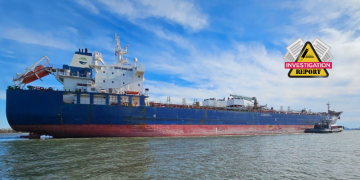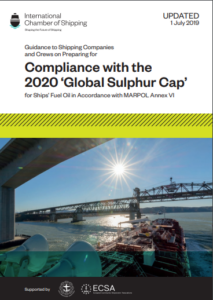With IMO 2020 just around the corner, the shipping industry must already have a plan to comply. However, despite the fact that we are just two months away from this groundbreaking regulation for maritime, there is increased uncertainty regarding compliant fuel oil availability worldwide. In such case, companies should have a plan to deal with such unavailability, with the answer might lying in the Fuel Oil Non-Availability Report (FONAR).
Compliant fuels are a certain way to comply with the 2020 sulphur cap, which mandates that the sulphur content on fuels must not be over 0.5%. However, today there is increased uncertainty surrounding the availability of these fuels.
As it can be understood, it is possible that a ship would not be able to bunker compliant fuel, in spite of its efforts. IMO, during its MEPC 74, discussed this possibility, concluding that in such cases, operators must submit a fuel oil non-availability reporting (FONAR).
What is a FONAR?
As said above, it is possible that despite best efforts, a ship could not obtain compliant fuel. In these cases, the ship must complete a FONAR, while also notifying its Flag State, as well as the competent authority of the port of destination.
Namely, the ship must provide evidence that it attempted to obtain compliant fuel oil, as its voyage plan stated, but the fuel was not available. In addition, it must prove that attempts were also made to find alternative sources for such fuel oil, and that despite best efforts to obtain compliant fuel oil, no such fuel oil was.
The FONAR means to capture this information, as the ship should not be required to change its intended voyage or unduly delay the voyage in order to comply with the 2020 sulphur cap.
The evidence that compliant fuel was not available can be shown through documentation, statements and correspondence, indicating that all possibilities were considered to obtain compliant fuel. If the ship decided not to bunker compliant fuel because of fuel oil quality concerns, taking into consideration safety and operational problems, such concerns must be thoroughly documented, and they must be supported by proper equipment or the engine manufacturer’s recommendations.
What information should a FONAR contain
- The ship’s name, flag, and IMO number;
- The ship’s voyage plan at the time of entry into the North American ECA;
- When the ship first received notice it would be conducting a voyage involving transit in the North American ECA, and its location when it first received such notice;
- The date and time the ship operator expects to enter and exit the North American ECA, as well as the projected days on which the ship’s main propulsion engines will be in operation;
- The sulphur content of the fuel oil used when entering and operating in the North American ECA;
- A description of the actions taken to attempt to achieve compliance prior to entering the North American ECA;
- A description of why compliant fuel oil was not available;
- In cases of fuel oil supply disruption, the name of the port at which the vessel was scheduled to receive compliant fuel oil and the name of the fuel oil supplier that is now reporting the non-availability of compliant fuel oil;
- Any operational constraints preventing use of compliant fuel oil;
- Availability of compliant fuel oil at first port of call in the US, and plans to obtain that fuel oil;
- If compliant oil is not available in the US, then the lowest sulphur content of the available fuel oil.
As to when the FONAR should be submitted, the UK Club says that it should be sent as soon as it is determined, or when the ship becomes aware that compliant fuel oil will not be available. After submission, a copy of the FONAR should be kept on board for at least 36 months.
In order to help shipping companies understand more about the use of FONARs, IMO has developed a standard format for reporting fuel oil non-availability. The following factors should be considered before deciding whether to bunker non-compliant fuels:
- Shipowners, operators and charterers are expected to take into account any logistical constraints, including the availability of compliant fuel at berths within the port, as well as terminal or port policies when planning for bunker delivery;
- A Fuel Oil Non-Availability Report (FONAR) should not be considered as exemption from the relevant sulphur limit requirements. It is up to those Administrations that receive the FONAR to take into account all relevant circumstances and the evidence presented to determine the appropriate action to take, including not taking control measures;
- The higher cost of compliant fuel will not be considered as a valid basis for claiming non-availability. In any case, the cost difference between compliant and non-compliant fuels may be relatively small compared to the cost and effort that may be involved in cleaning a fuel tank and associated systems after a voyage using non-compliant high sulphur fuel;
- Ships will be expected to bunker and use all types of 0.50% Smax compliant fuels. Exceptions to this option may be accepted by Port State Control authorities following consideration of the ability of the ship’s fuel oil system to safely store, process and consume a particular type of compliant fuel and the need for cleaning out the tanks of all remaining fuel residue prior to loading non-compatible alternatives into the same tank;
- Shipowners and operators should give careful consideration to the quantity of non-compliant fuel bunkered where there is non-availability of compliant fuel. In these situations, the minimum possible quantity should be bunkered as it is possible that any remaining non-compliant fuel will be required to be debunkered once compliant fuel has been obtained.
Is FONAR a ‘’free pass’’ to non-compliance?
The idea that a FONAR could be considered as a ‘get out of jail free’ card is misunderstood, as it is a mechanism for ships to self-report non-compliance.
According to BIMCO, a FONAR does not mean that the authorities of the port state will be more lenient towards the non-compliant ship. For this reason, ships should submit the FONAR before arriving to the port, while they must also inform the flag, the P&I Club and class, in order to consider the solution.
Nevertheless, even if the ship has done everything right in submitting the FONAR, still the cost for its non-compliance could be massive. A reason for that could be that the vessel must get rid of the non-compliant fuel before leaving the port. Moreover, debunkering could eventually lead to a high cost, while it may also result to more than a fine.
Being detained and asked to debunker the non-compliant fuel could have a severe impact.
BIMCO’s Manager, Christian Baekmark Schiolborg, said.
In the same wavelength, IBIA warns that the repeated use of FONARs could also raise suspicions of abuse, which could in turn lead to more frequent investigations of the ship.
Furthermore, ships must consider another tricky situation. What a vessel would do if there is a bunker delivery note (BDN) saying that the fuel is compliant, but its test programme results clearly suggest it is not. In such cases, a FONAR does not provide cover, assuming that the ship should had been supplied compliant fuel oil.
What is more, the IMO’s reporting area, GISIS (Global Integrated Shipping Information System), is another area of concern. Currently, it is not clear how FONARs would be reflected on GISIS, which already has a module for reporting non-availability of compliant fuel oil. Of course, the system can be improved, like attempts efforts to verify the information submitted.
Reasonably, the magnitude of the change the 2020 sulphur cap will bring to the shipping industry, creates many uncertainties. These will be amplified if compliant fuel is unavailable. IMO has tried to resolve such cases with the use of FONARs, however operators should consider one important issue; FONARs should be the last option, and are not a ‘get out of jail free’ card to avoid non-compliance penalties.




































































































































